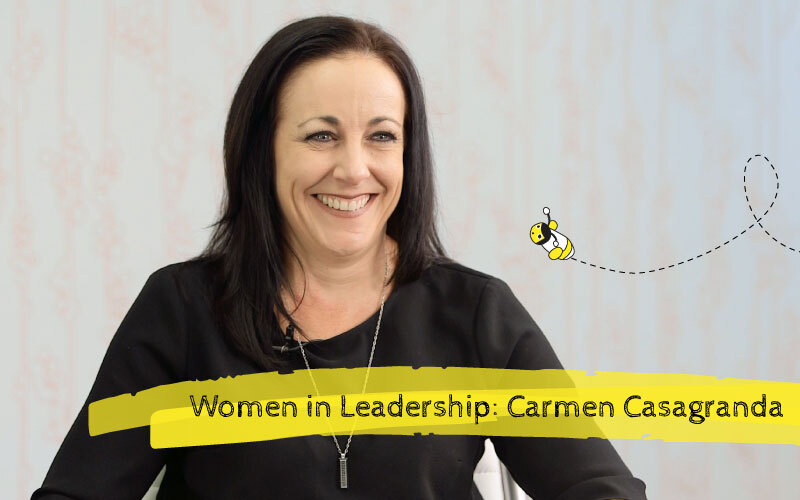Welcome to our Beyond Recruitment Women in Leadership series, dedicated to the journeys of women in leadership across New Zealand businesses. There’s currently a lot of discussion around women not being in leadership roles, not joining the executive ranks or not serving on boards. We’ve found however, that there are so many stories to share of women who have done well in leadership, and so many organisations that are running fantastic programs to allow women to grow in leadership roles.
We recently sat down with Carmen Casagranda, Chief Information Officer at Cigna, to talk about leadership, learnings and her experience as a woman in leadership. To find out more about Carmen's leadership journey, her proudest moment and her advice to women looking to pursue leadership, watch the video below.
Becoming a Leader
Carmen has an interesting, varied background. After moving to New Zealand from Canada with her family, as a 10-year-old, Carmen went on achieve both a Bachelor of Commerce in Marketing and Management and a Bachelor of Science in Psychology. Her honours thesis was about relationship marketing online, her first step into what would eventually become a career path. Carmen then worked in the UK for seven years, before returning to New Zealand in 2009 and taking up a role as a Programme Manager at Cigna, going on to become National IT Manager and eventually, CIO.
Although Carmen says that it is easier now to progress in leadership roles than it was when she started her career, she puts most of this down to personal capability. "As you mature in your career development, you also mature in your capability to establish relationships and work with people, and you move from being a people manager into being a leader," says Carmen. "It's that transition that starts to ensure you stand out differently from other people. That's probably been the biggest journey I've been on, particularly since I've been in my CIO role. I've very much pulled more on my psychology background than I have on my management and marketing background."
Carmen also believes that working with and helping others is a key part of being a leader. "[It's] also less about having to prove myself and my capability, because most of my career's been about doing that. Now it's about empowering others and really learning how to be the coach, to be the leader, and to build a team that is capable themselves and empowered themselves," Carmen says. "That's been quite a big transition for me personally, and the more I've focused on the coaching the better my team has become, and the more motivated and high performing they're becoming as well."
Overcoming Challenges as a Woman in Leadership
Carmen says that, aside from "the odd comment", she hasn't faced much in the way of discrimination in the workplace. She says her key to avoiding this is being "ruthless with standards," and treating people the way she expects to be treated. "If people do ever treat me in a way that doesn't meet those expectations, I very much let it be known at that point in time what those expectations are. So, it's less about gender, and more about making sure that in those relationships, people know where they stand. And if someone's crossed a line for me personally then I'll make sure that conversation is had in a timely manner."
Carmen believes that, although there is more that society can do to help women in the workplace – such as a diversity programmes and encouraging women in technology – there are also some things women can do to help themselves. "Women are very quick to criticise themselves and believe they can't do something, whereas the opposite is that men are very quick to overpromote themselves and jump at something." says Carmen. "I think that, in recognising those behaviours, sometimes it's actually being brave enough to step outside your comfort zone and go 'actually I can take a chance on this' and 'I can tell my story' and 'I can have those difficult, perhaps courageous, conversations to make sure my voice is heard.'"
Carmen's Advice
Carmen says that, for aspiring women leaders, "the most important thing is to believe in yourself." She believes that being a successful leader is less about gender, and more about what you're trying to achieve, and how you work with the people around you to achieve that. "Have a story that you believe in, and make sure that you're comfortable being able to stand up for that." says Carmen. "Everybody comes in as a leader with what they know, but I think the most important thing about being a leader is recognising what you don't know. To be a successful leader isn't about standing in front of a crowd and professing everything that you know."
Like many things in life, Carmen believes that the journey itself is an important part of leading a team. "It's about inspiring the people around you to share in that knowledge journey – and actually being courageous enough to say when you don't know something, and to have that humility and that relationship with the people around you. That's what makes people communally want to work together and drive towards an end goal." Carmen says. "I think that as a leader you need to have that goal. You don't necessarily need to know how you're going to get there, but if people know what the journey is then they'll understand and they'll commit to that."
With Thanks
A huge thank you to Carmen for taking the time to talk to us and share her experiences, insights and advice.
Watch this space for the next edition of the Women in Leadership blog series, and if you have a great story you’d like to share, then feel free to get in touch.



.png)

